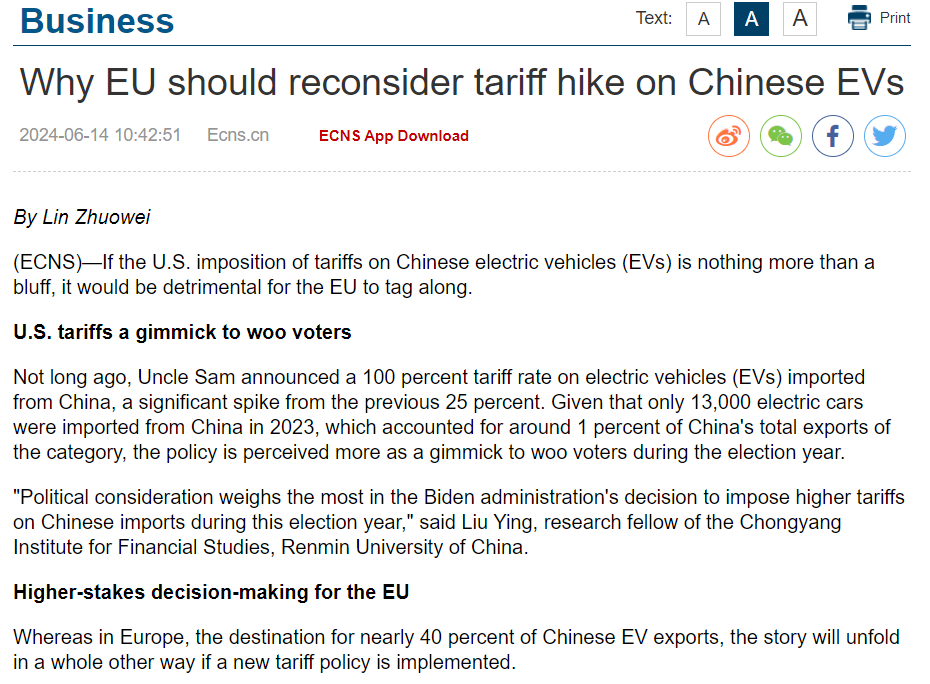LATEST INSIGHTS
Your Present Location: LATEST INSIGHTSLiu Ying: Why EU should reconsider tariff hike on Chinese EVs
Source: ECNS Published: 2024-06-14

By Lin Zhuowei
(ECNS)—If the U.S. imposition of tariffs on Chinese electric vehicles (EVs) is nothing more than a bluff, it would be detrimental for the EU to tag along.
U.S. tariffs a gimmick to woo voters
Not long ago, Uncle Sam announced a 100 percent tariff rate on electric vehicles (EVs) imported from China, a significant spike from the previous 25 percent. Given that only 13,000 electric cars were imported from China in 2023, which accounted for around 1 percent of China's total exports of the category, the policy is perceived more as a gimmick to woo voters during the election year.
'Political consideration weighs the most in the Biden administration's decision to impose higher tariffs on Chinese imports during this election year,' said Liu Ying, research fellow of the Chongyang Institute for Financial Studies, Renmin University of China.
Higher-stakes decision-making for the EU
Whereas in Europe, the destination for nearly 40 percent of Chinese EV exports, the story will unfold in a whole other way if a new tariff policy is implemented.
Now, Europe is in a tight spot. The tariff rate on EVs stands at 10 percent, however, with an ongoing anti-subsidy investigation into EVs from China launched last October that could impose provisional EV duties of 38 percent.
Moreover, Ursula von der Leyen, president of the European Commission, has repeatedly called for action against China's EV industry.
Nonetheless, not all bloc members are on the same page. In a recent interview, Josep Borrell, the EU's high representative for Foreign Affairs and Security Policy, remarked that 'decoupling' from China is very difficult while expressing the hope for continuing mutually beneficial trade with China that is both fair and balanced. Borrell was also quoted as saying that the EU will not follow the United States in imposing tariffs on China, and that a trade war must be avoided.
Strong opposition from the auto industry
Voices for rationality and restraint have also been heard across Germany, the largest EV producer in Europe.
German Chancellor Olaf Scholz said slapping new tariffs would 'ultimately make everything more expensive and everyone poorer.' He added: 'We do not close our markets to foreign companies because we do not want that for our companies either.'
In the European Union, around 50 percent of EV imports from China are from Western brands such as Tesla, Volkswagen, and BMW. The automotive industrial chains between China and the EU have been integrated following years of collaboration. If higher EU tariffs were to be in place, European automakers would bear the brunt.
Meanwhile, European car buyers would pay higher prices for the same products, as locally-made cars are more expensive than Chinese alternatives, according to the Kiel Institute for the World Economy.
EU's green transition to be jeopardized
What is also at stake is the EU's aim to be climate-neutral by 2050 if the trade of foreign EVs were to be hit by higher tariffs, particularly considering that the bloc aims to impose a full fossil-fuel car ban in 2035.
BMW CEO Oliver Zipse called additional tariffs on Chinese EVs 'the wrong way to go'. He warned that punitive tariffs could jeopardize the growth of EVs which serve as a way of mobility that is more ecologically sustainable.
In fact, the anti-subsidy investigation was launched by the European Commission rather than the European auto industry. The Commission's decision came seven days later than originally planned due to fierce opposition.
Neither fundamental conflicts of interest, nor geopolitical tensions, lie between Europe and China. Protectionism only leads to nowhere, while cooperation benefits all. The European Union should know that it has a better option.























































































 京公网安备 11010802037854号
京公网安备 11010802037854号





